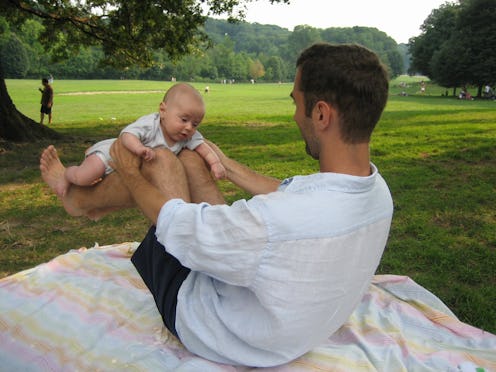Life
How Fatherhood Made Me Embrace My Inner Feminist

My five-year-old son Felix is a hand-holder. Whether strolling down the street, or climbing the steps to build LEGO in his room, or escorting me out of his pre-K classroom at drop-off, he wraps his soft little digits around my long, dry, increasingly wrinkled ones. Sometimes he holds my hand to offer a gentle squeeze of support, or to emphasize a joke, or simply to express gratitude.
Me? I've never been into such public displays of affection. My wife would reach for my hand and I'd give it to her all limp, hanging heavy and listless. I'd rather make out, which at least seems passionate, then link myself to another person in such a corny, weak, co-dependent way. Walking arm-in-arm, ok. But holding hands is so ... girly.
At least that's what I thought. My son, with his hand holding, warm cuddling, and bear hugging, has shown me the joys of not just having feelings, but expressing them with no shields up or self-conscious tics, and without designating activities as feminine or masculine. That this was a bias I even had has surprised me, because I had considered myself a liberal guy when it comes to gender.
[my son] came to regard pink as his favorite color, and only encountered the “pink is for girls” BS from his peers. More so than Woody or Buzz Lightyear, he adored Jesse the Cowgirl from Toy Story, and wouldn't just play with her but sleep with her as well.
In college, I sometimes enjoyed donning a dress for parties, and spent a year or so clipping my long hair back with barrettes and wearing either silky women's blouses or oversized men's business shirts. I admired (and still do) androgynous figures like Emcee from Cabaret, or 1970's era David Bowie. Even at Oberlin, where I went to school, this garnered attention.
After college, I left a corporate job because it struck me as being an old boys club, specifically a white old boys club, and I went to teach in underserved neighborhoods of New York City, where I was often one of the few men in the building. I had no problem working with and for women, or voting for women, or with anything about women, aside from holding hands, which my wife often complained about. “Will you relax and just take my hand!” she'd say. Maybe on trips to Europe, but not when walking the streets of New York.
At least, not till my son came on the scene. When he was born it made sense that I, a writer, would stay home with him while my wife returned to her job. Staying at home didn't appeal to her, while finding a job just to throw most of the salary away on childcare seemed foolish to me. Besides, I wanted to be there as closely as I could to experience life with our baby. It didn't occur to me that this decision had a political element, but of course it does. My wife and I believed that I could do just as good a job caring for my son as she could, just as she can be as good a leader in the workplace as I could.
In my first couple of years home with my son, I didn't identify myself as a feminist dad. I figured feminism was something you needed to study, and, once, when a friend said I was a real feminist, I even looked up the word to make sure that it was an attitude a man can claim. (It is.)
As my son learned to speak and ask questions about the world, I realized how deeply ingrained my feminism is. He came to regard pink as his favorite color, and only encountered the “pink is for girls” BS from his peers. More so than Woody or Buzz Lightyear, he adored Jesse the Cowgirl from Toy Story, and wouldn't just play with her but sleep with her as well. She was to him what Woody is to Andy in the movie, and again, he never had an inkling this might not be the norm for most boys until his peers told him so.
Hearing Felix spout crap like "girls wear pink dresses" or "boys don't put color on their toenails" brought heat to my cheeks. And so I began to take a more actively feminist stance in my parenting, talking with him about gender roles and identity in ways he would be able to understand. Pointing out, for example, that his mother doesn't own a single pink dress, and telling him about how I used to paint my nails. When we watch TV, I often comment on the gender of the characters, and sometimes criticize shows for relegating women to side-characters, or denying them the full range of powers and autonomy that the men have.
I've come to recognize that there is a political dimension to my domestic choices and my work. If men don't decide to be more involved around the house and with childcare, and more candid discussing these decisions, then the gender dynamic in our culture that sees women as primarily responsible for children or affected by having a family will never change. Now I own that.
These days, I have no issues holding my wife's hand when we're out and about, or my son's, despite the fact that, yes, once we were criticized by someone on the street, who announced as we passed that he was too old to be holding his daddy's hand. Felix looked at me after she said that, and I could see him gauging my reaction. “Some people just aren't comfortable seeing people love one another,” I told him. “I think that's sad.”
“Me too,” he said.
“I'll hold your hand whenever you like.”
He didn't say thanks, he just gave my fingers a little squeeze.